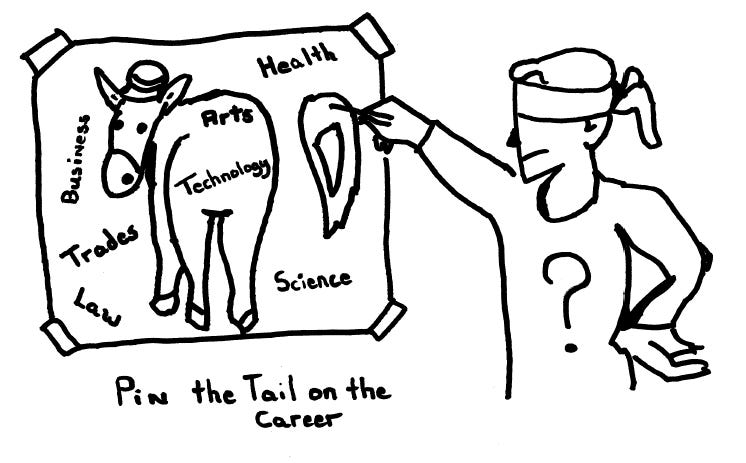I recently bumped into an alum of one of our career acceleration programs. He was deciding between three exciting job opportunities in front of him, and was struggling to decide which one he should take: Should he stay in his current role, go work on a social impact project in Africa, or go start his own social enterprise in his country of birth (India). He had previously shared that his long-term goal was to return to India, but that he had other dreams, too. These dreams included spending time in the startup hotspots of East Africa and Central America. To make things more complicated, he was already working at a really great organization, and walking away from his current role was going to be tough.
He shared that his dilemma was getting harder as role models of his were providing conflicting advice… One successful entrepreneur told him that if his long-term goal was to be the founder of a social enterprise in India, then he needs to “stop wasting time and go do that”. Meanwhile, friends of his were reminding him that his dream was to spend time in Africa, and so he should do that before setting his roots down in India. Family told him it was foolish to leave a secure job that had so much purpose and impact.

And he’s not alone.
Every year, I talk to hundreds of mid-career professionals looking at really hard career decisions. Should I leave the security of a big company? Should I take the risk at a startup that might go out of business? Will I be able to recover my career path if I don’t succeed in the new role? Once upon a time, I faced this really challenging decision, too.
A career coach will give different guidance than what I’m going to share below, and truth be told, hiring a career coach to weigh through these decisions is likely a good idea. But while most people will give you guidance that will make them look good in the short-term, when it comes to your career, you need to think long-term. And if you want to be happy in the long-term, science clearly shows there is one thing you need to prioritize above all else: minimize regret.
“Indeed, in the long run, people of every age and in every walk of life seem to regret “not” having done things much more than they regret things they “did,” which is why the most popular regrets include not going to college, not grasping profitable business opportunities, and not spending enough time with family and friends.” –Daniel Gilbert
The science here is clear: you will regret the things you didn’t do, not the things you tried doing. In fact, Jeff Bezos coined a new phrase upon starting Amazon 20 years ago — he called it the “regret minimization framework”.
The premise is simple:
- Think ahead to your deathbed
- Now look back on your life
- Ask yourself this: “What would you regret not doing?”
- Write it down
- Go do it
One thing to acknowledge before minimizing your regrets: In my experience, this “regret minimization” framework creates short-term stress and uncertainty. Your next step might not work as planned. You might miss an exciting opportunity. You will miss your friends and family. But remember, this is a long-term play, and you’re not alone should you decide to chase your dreams.
But don’t let that hold you back. From personal experience, I can assure you that things will work out. As Steve Jobs prescribes,
“You can’t connect the dots looking forward; you can only connect them looking backward. So you have to trust that the dots will somehow connect in your future.”
But remember, that a support community and accountability structure is a great way to help you achieve your goals!
I hope you’ll join me in making 2019 a year of long-term regret minimization! And if you need a hand, I invite you to apply to our MovingWorlds Insitute social impact + career acceleration fellowship.



